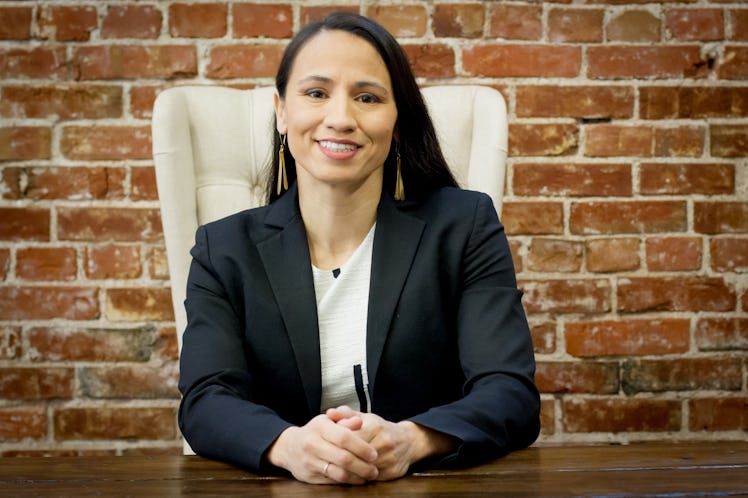
Sharice David's Victory In Kansas Just Made History For Congress
Even before voters hit the polls on Election Tuesday, the 2018 midterm election had already proved to be a pivotal one. In a year marked by seismic political energy, Democrat Sharice Davids' win in Kansas is a huge victory for more than just "Blue Wave" progressives. On Tuesday, Nov. 6, Davids ousted Republican incumbent Rep. Kevin Yoder in Kansas' 3rd congressional district, and in doing so made history as one of the first indigenous women to join the ranks of Congress.
No indigenous women have ever served the chamber, but after Tuesday's showing, history has been made. Democrat Deb Haaland also made a bid for a House seat in New Mexico to become another potential-first indigenous woman in Congress. Elite Daily interviewed Davids prior to her primary win in August.
"When people see a black woman or a native woman or a Latina or an LGBT person, it should be part of the norm that they look and see a leader," Davids told me back in June. While one or two isn't enough to represent a "norm," Davids' historic win has brought that reality much closer.
Aside from boosting the number of Native American women in Congress, she's also the first openly LGBTQ representative from the state, as well as one of the only LGBTQ woman in the House.
Davids's win sways the tally of openly LGBTQ members of Congress. With the absence of Rep. Krysten Sinema, who was running for Senate in Arizona, the House was left devoid of any LGBTQ women. On the Senate side, Sen. Tammy Baldwin, if she is joined by Sinema, will mark a new record in female LGBTQ representation in that chamber. With Davids' victory, the House again has at least one female LGBTQ member. As the Victory Fund, which advocates for electing more LGBTQ leaders, told Elite Daily back in August: "When LGBTQ people are in the halls of power, they end up humanizing our lives for our fellow lawmakers."
Davids accomplished a David-and-Goliath feat by taking on Yoder, who was armed with a substantial war chest. Until the fall, she had less than a tenth of the funding of her opponent, and as challengers to the House go, the old rule of thumb is that the better-funded candidate is inclined to win.
She ran on a progressive platform that including pushing for expanded healthcare protection, reducing student loan burdens, addressing climate change, and enacting common sense gun control, among other things.
The young lawyer, noted for her work in the Obama administration (not to mention being a former mixed martial arts fighter), was something of an underdog in a state that went for Donald Trump by a 20-point margin in 2016. But she told me, "The more times people question what I'm doing, the more I see that it's exactly what I should be doing."
And apparently her can-do attitude had merit. Following her out-of-the-blue victory in June, Davids picked up some key endorsements, and lots of fundraising steam — reportedly gaining over $2.7 million in funding between July and September.
And the polls from FiveThirtyEight show a jaw-dropping change in Davids' trajectory. As early as Aug. 1, just six days before the primary, Davids was projected to have just a 20 percent chance of winning compared to Yoder's 78 percent. That drastically flipped after that primary win — as of Oct. 29, Davids and Yoder had switched places, with an 80-20 percent chance of winning, respectively. Apparently, Kansas voters were ready for some drastic changes, and in doing so, has sent one of the nation's first Native women to the House.